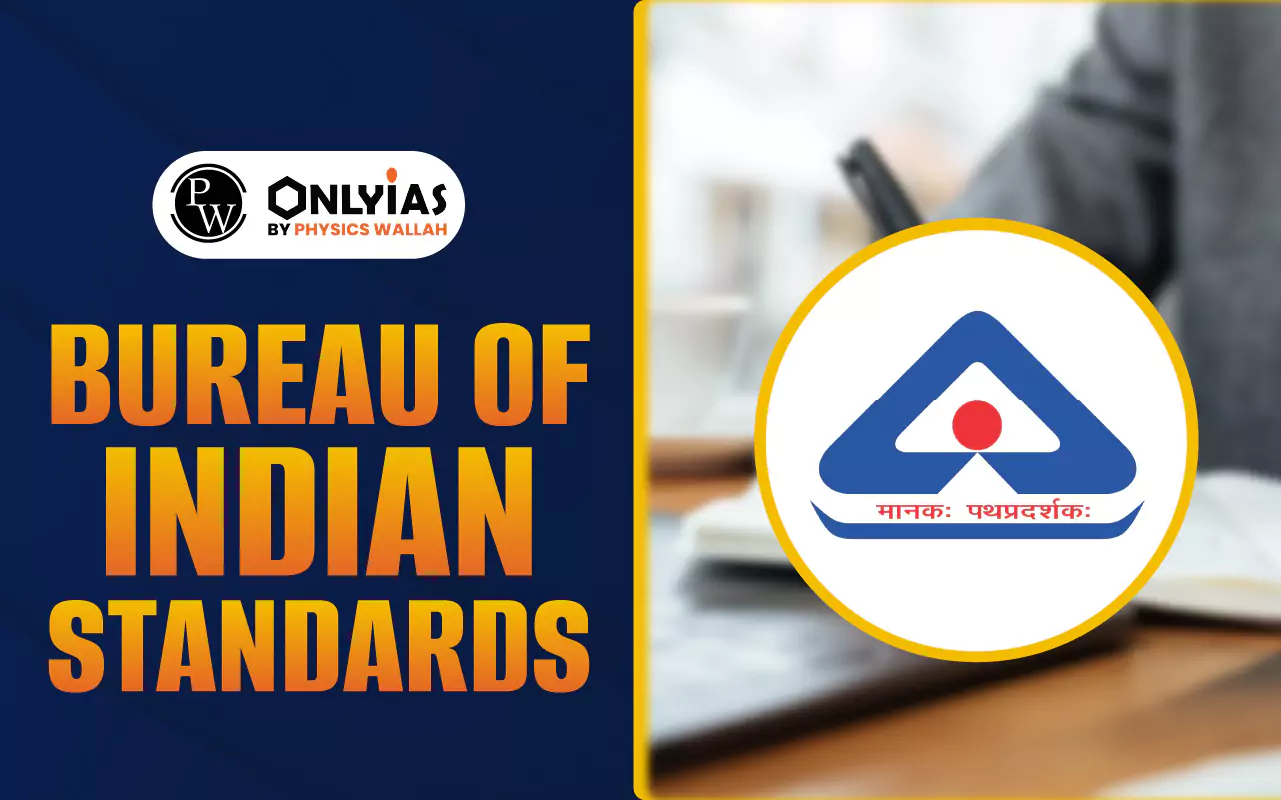The Bureau of Indian Standards (BIS) is the National Standards Body of India. BIS full form is Bureau of Indian Standards. It ensures quality, safety, certification, hallmarking, and supports consumer protection, trade, and industrial growth.

Bureau of Indian Standards (BIS) serves as the National Standards Body of India, operating under the Ministry of Consumer Affairs, Food & Public Distribution. Established under the BIS Act, 2016, BIS is the authoritative body responsible for the harmonious development of activities related to standardisation, quality certification, marking of goods, and the protection of consumers’ interests. The transformation from the Indian Standards Institution (ISI) to BIS marked a significant step towards ensuring reliable and safe products for Indian consumers.
The Bureau of Indian Standards was formed to develop and implement Indian Standards across sectors, thereby promoting quality assurance, consumer safety, and industrial growth. BIS helps minimise health hazards, ensures reliable product quality, and supports the government’s initiatives such as Make in India, Swachh Bharat Abhiyan, and Ease of Doing Business.
| Bureau of Indian Standards Overview | |
| Particulars | Details |
| Full Form | Bureau of Indian Standards (BIS) |
| Established | 1 April 1987 (under BIS Act, 1986); Latest Act enforced on 12 October 2017 |
| Parent Ministry | Ministry of Consumer Affairs, Food & Public Distribution |
| Headquarters | Manak Bhavan, 9 Bahadur Shah Zafar Marg, New Delhi – 110002 |
| Regional Offices | Kolkata (East), Mumbai (West), Chennai (South), Chandigarh (North), Delhi (Central) |
| Total Branch Offices | More than 20 across major Indian cities |
| BIS Chairman 2025 | Shri Pralhad Joshi, Hon’ble Minister for Consumer Affairs, Food & Public Distribution |
| Primary Roles and Functions | Standards formulation, certification, hallmarking, testing, training, consumer affairs |
| Key Activities | Product Certification, Compulsory Registration Scheme, Hallmarking, Foreign Certification |
| International Affiliations | ISO, IEC, SARSO, WTO-TBT Enquiry Point |
| Legislative Framework | BIS Act, 2016 |
| Standards Coverage | 14 Division Councils including Civil, Mechanical, Electronics, Food, Medical, Textile etc. |
| Certification Types | ISI Mark (Product Certification), Hallmark (Jewellery), FMCS (Foreign Certification Scheme) |
| Testing Infrastructure | 8 BIS Laboratories + NABL Accredited Labs across India |
| Training Arm | National Institute of Training for Standardization (NITS) |
| Key Objectives | Promote quality, consumer safety, environmental protection, export promotion |
The BIS full form stands for Bureau of Indian Standards. As the National Standards Body of India, BIS is entrusted with the task of standardisation, quality assurance, and conformity assessment across various sectors. The name reflects its core function—ensuring that goods and services in India meet defined quality benchmarks.
The Bureau of Indian Standards operates under the Ministry of Consumer Affairs, Food & Public Distribution, and its scope includes everything from product certification to lab testing, hallmarking, training, and consumer engagement.
Bis Introduces Standard For Agri By-Product Utensils
The journey of BIS began with the Indian Standards Institution (ISI), formed on 6 January 1947. Initially focused solely on standardisation, ISI introduced the Certification Marks Scheme in 1955 to extend its services to consumers. The Bureau of Indian Standards was formally established on 1 April 1987, under the BIS Act of 1986, succeeding ISI. The BIS Act, 2016, further expanded its mandate, aligning it with modern global practices.
The Bureau of Indian Standards headquarters is located at Manak Bhavan, 9 Bahadur Shah Zafar Marg, New Delhi – 110002. Additionally, BIS operates five regional offices in Kolkata, Mumbai, Chennai, Chandigarh, and Delhi, along with more than 20 branch offices in cities like Bangalore, Patna, Jaipur, Hyderabad, and others. These serve as vital nodes for certification services, public awareness, and industry coordination.
The Bureau of Indian Standards’ roles and functions are comprehensive and extend across various sectors. Key functions include:
The core Bureau of Indian Standards objectives and activities revolve around:
BIS also aims to align Indian standards with international norms to facilitate global trade.
The BIS standards list spans a wide range of industries and sectors, grouped under the following 14 divisions:
Each area is governed by Division Councils and Sectional Committees, ensuring thorough and relevant standardisation across industries, which draft, review, and publish standards relevant to their field.
The Product Certification Scheme grants the ISI Mark to products conforming to Indian Standards. Though voluntary, the Central Government mandates BIS certification for specific goods to safeguard public health, environmental safety, and national security. Such products are governed under Quality Control Orders (QCOs).
The Compulsory Registration Scheme (CRS) applies primarily to electronics and IT goods, as per MeitY’s mandate, with a simplified process called Declaration of Conformity.
The Hallmarking Scheme, initiated in 2000 for gold and extended in 2005 for silver jewellery, ensures the purity and fineness of precious metal articles. Products are tested at BIS-recognised Assaying & Hallmarking Centres, and jewellers must be registered with BIS to sell hallmarked items.
As of 2025, the BIS chairman 2025 is Shri Pralhad Joshi, the Hon’ble Minister for Consumer Affairs, Food & Public Distribution.

Source: Bis.gov.in
The Bureau operates under his leadership, supported by 25 members from various government departments, industries, research institutions, and consumer organisations.
BIS operates 8 laboratories nationwide for product testing and conformity assessment:
These labs ensure thorough testing and facilitate certification processes.
BIS plays a significant role on the global stage:
To raise awareness about quality standards, BIS actively organises:
The National Institute of Training for Standardisation (NITS) imparts training to technical professionals, industry representatives, and officials from developing countries. Training modules focus on standardisation, conformity assessment, and management systems.
The Bureau of Indian Standards continues to serve as a cornerstone of India’s quality infrastructure, ensuring safety, reliability, and excellence in goods and services. With its wide mandate covering standardisation, certification, testing, and public awareness, BIS plays a crucial role in strengthening India’s manufacturing ecosystem, enhancing consumer trust, and facilitating global trade. As India moves towards a robust and self-reliant economy, the Bureau of Indian Standards remains at the forefront of enabling quality and innovation.
Ready to boost your UPSC 2025 preparation? Join PW’s UPSC online courses today!
The Bureau of Indian Standards is India’s national standards body, responsible for standardization, certification, and quality assurance.
The BIS full form is Bureau of Indian Standards, established under the BIS Act, 2016.
The Bureau of Indian Standards headquarters is located at Manak Bhavan, New Delhi.
BIS formulates standards, certifies products, conducts testing, and promotes consumer awareness across industries.
Its objectives include promoting standardisation, ensuring product safety, supporting trade, and enhancing consumer protection.
The BIS standards list is available on the official BIS website, covering over 21,000 Indian Standards across 14 sectors.
<div class="new-fform">
</div>